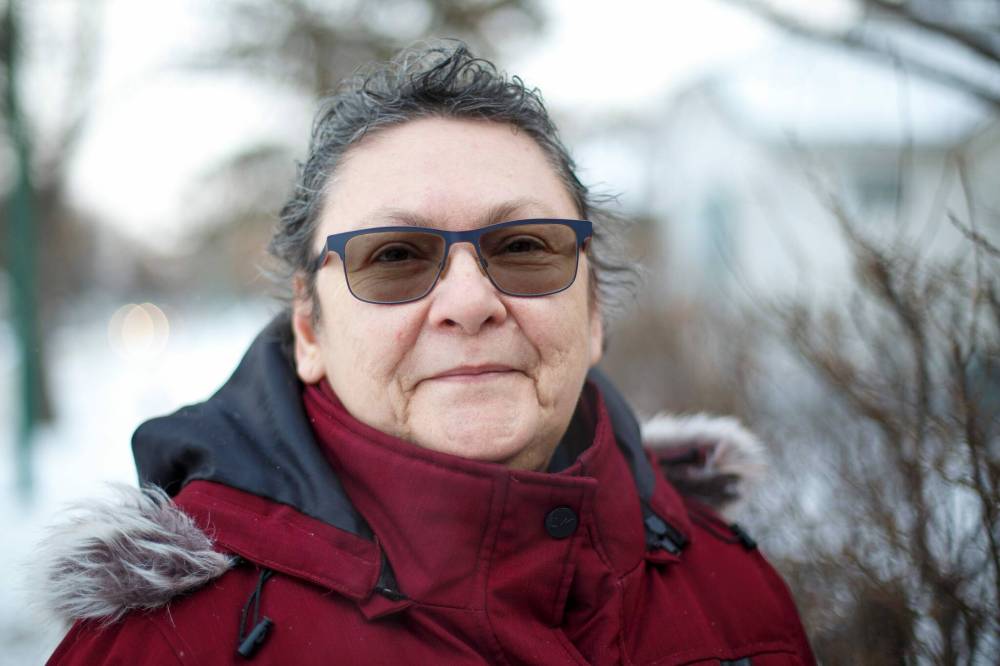End Homelessness Winnipeg is pitching “duty to assist” laws so schools and youth-serving organizations must intervene when a student is couch-surfing, with a goal of preventing chronic homelessness.
“If we say we want to end homelessness, we need to get upstream,” said Betty Edel, an inner-city school trustee whose day job is managing the city charity’s housing supports team.
Edel noted that youth aged 24 and under accounted for 22 per cent of people who were homeless in Winnipeg in 2022 — the most recent available street census data.

MIKE DEAL / FREE PRESS FILES
Betty Edel, an inner-city school trustee whose day job is managing the city charity’s housing supports team.
That’s why she and her colleagues at End Homelessness Winnipeg have been meeting with community leaders to discuss a Welsh principle that has transformed the U.K. country’s response to housing insecurity over the last decade.
The National Assembly of Wales took a legislative approach to prevent homelessness in 2014 through a now-internationally recognized concept known as duty to assist.
The pioneering strategy protects every child’s right to housing and makes municipal authorities responsible for taking reasonable steps to prevent youth homelessness.
It also makes teachers, librarians and other professionals who work closely with students obligated to refer those in precarious housing situations to local service providers.
“To be clear, this does not mean simply suggesting resources,” states an excerpt from a 2019 report on its principles, compiled by the Canadian Observatory on Homelessness and other entities that study youth homelessness.
“It requires an understanding of the referral process and, with the young person’s consent, guiding them to an appropriate service or support in their community.”
During a three-day conference in October, End Homelessness Winnipeg introduced school leaders and civil servants to the framework and asked them to consider how it could be implemented locally.
Peter Mackie, a professor at Cardiff University who researches housing, flew in from the Welsh capital to speak at the event.
Edel said she was heartened by the widespread community contributions, input and interest in improving prevention and early intervention efforts across Manitoba.
The City of Winnipeg donated Sergeant Tommy Prince Place to host about 80 attendees, including youth who have lived experience with homelessness, from Oct. 16 to 18.
The status-quo system leads to fruitless referrals, youth being put on wait lists, and students struggling to navigate complex processes, Edel said.
Her team has been consulting with young people who have experienced — and in some cases, continue to experience — housing insecurity.
Their findings? Reports of shoddy services, limited affordable-housing options, difficulty focusing on school work and personal challenges related to living with trauma and related mental-health concerns.
“It’s life that’s hitting them, and they need to deal with the crisis they’re in — never mind just going to school,” said Edel, a veteran trustee in the Winnipeg School Division.
Housing advocates are scheduling a followup meeting with metro superintendents in early 2025 to discuss next steps for schools.
WSD, the largest of its kind, has already partnered with End Homelessness Winnipeg to host free expos with identification and housing-related support service booths to help youth find safe and stable accommodation.
Edel, who represents residents and schools located in the North End, William Whyte and St. John’s, said this work intersects with addressing absenteeism and student success.
An average of 400 Grades 7-12 students in the North End were reported “inactive,” meaning they stopped attending class at some point after Sept. 30 in any given year, between 2009 and 2019. The Indigenous Education Caring Society was founded to tackle that trend.
“Teachers and everyone in the school system cares,” Edel said, “but if you don’t understand the system and you don’t understand the resources or the lack of resources, then how do you actually help?”
maggie.macintosh@freepress.mb.ca

Maggie Macintosh
Education reporter
Maggie Macintosh reports on education for the Free Press. Originally from Hamilton, Ont., she joined the newsroom as a reporter in 2019. Read more about Maggie.
Funding for the Free Press education reporter comes from the Government of Canada through the Local Journalism Initiative.
Every piece of reporting Maggie produces is reviewed by an editing team before it is posted online or published in print — part of the Free Press‘s tradition, since 1872, of producing reliable independent journalism. Read more about Free Press’s history and mandate, and learn how our newsroom operates.
Our newsroom depends on a growing audience of readers to power our journalism. If you are not a paid reader, please consider becoming a subscriber.
Our newsroom depends on its audience of readers to power our journalism. Thank you for your support.